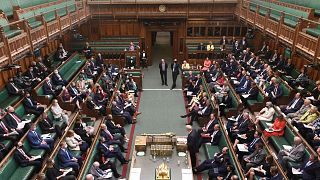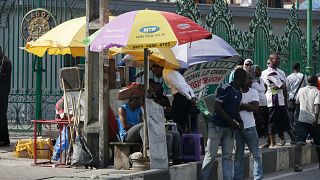Cameroon
Many schools in the english-speaking region of Cameroon remain closed as tensions between the Francophone and Anglophone regions mount. The english speaking regions says they are being politically and economically sidelined by the Francophone government.
Over 100 people were arrested and one person killed in November last year in the north-western town of Bamenda, following days of violent protests over the issue.
French is spoken in eight of Cameroon’s 10 regions and English in the north-western and south-western regions.
Here in Kumba, the second largest english speaking city in Cameroon, there is little economic activity following a strike that began two months ago by lawyers and teachers, protesting against the alleged marginalization in the majority Francophone country.
Those living in the Anglophone region complain that official documents are always in French and that the language barrier disqualifies them from most government jobs.
They also accuse the authorities of imposing French on their education and legal systems.
“Our subsection of education has been destroyed. So the strike was to meet the forces, the government, so they could bring back our subsection of education as it was. We inherited it from our colonial masters (England) and it must be maintained. There is nothing like to harmonies it. They are trying to harmonies the English subsection and the French subsection which cannot work,” said local teacher, Patrick Ejole.
As the crisis deepens, parents say they are afraid of sending their children to school, while some students are themselves taking part in the strike.
“Teachers have some grievances. I’m afraid to send my children to school because of the constant gun shots. They can be shot,” said one resident Peter Meh.
“Concerning the strike situation in the country, I really think it worth it because concerning the unemployment levels and everything, the Anglophone marginalization in our country. It’s really an appalling situation and I really think this sacrifice of not going to school is worth it if it going to bring a change. If it going to attract attention to our country so that maybe foreign bodies can look into our situation. If this is what it takes then I really think it’s worth it,” said student, Njume Pecy Esape.
Businesses in the region have also been affected following an internet ban last month – part of efforts by the government to silence growing calls for either federalism or secession in the Anglophone region.
Internet users in english speaking Cameroon say that they can no longer communicate or access information, particularly on social media.
Analysts warn that the clampdown on the region will only inspire more people to join the protests.
“We are are having this right now because we have a new generation of Anglophones, and because the counTry is alSO free then when you were born. People were living in a different system. Now the country is free, we might not perhaps appreciate it or we may have a different point of view than we did in the 60’s and the 70’s, the situation is not the same. Another thing that has given an impact to the whole movement is the rise of social media. The government can no longer control how it decides to enforce its laws,” said
In his end of year address to the nation, Cameroon’s president Paul Biya dismissed calls for secession, saying the country will remain united. Biya – in power since 1982, is one of Africa’s longest-serving presidents.
Cameroon’s government says the internet blackout is temporary and that the arrests of political leaders and activists are necessary to maintain peace.












02:55
In Cameroon, Paul Biya's candidacy divides his party
11:14
Rwanda Walks Away: what’s behind the Central Africa rift? [Business Africa]
01:12
Cameroon tops list of world's most neglected displacement crises
00:57
Nigeria crisis: 20,000 flee Marte after militant attacks
Go to video
Cameroon soccer great Emmanuel Kundé dies at age 68
00:49
Teachers strike shuts down schools across Cameroon